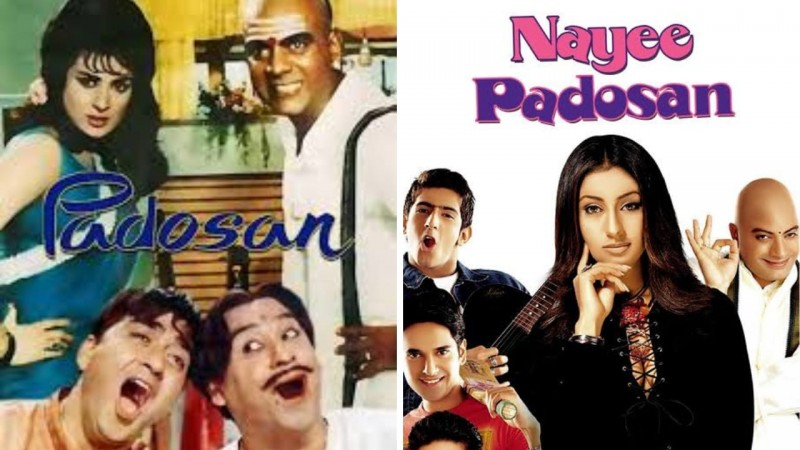
There is a long tradition of iconic films in Indian cinema that have captured audiences' hearts over the years. The 1968 movie "Padosan" is one such timeless masterpiece that is still loved today. In Indian cinema, "Padosan" is revered for its enduring humour, catchy songs, and outstanding performances. Nearly forty years after the original release of this beloved classic, Bollywood decided to revive it in 2003 and created "Nayee Padosan." In this article, we'll take a closer look at both films and analyse their parallels, discrepancies, and effects on Indian cinema.
A comedy classic that has stood the test of time is "Padosan," which was directed by Jyoti Swaroop. The plot of the movie centres around a love triangle involving Bhola (Sunil Dutt), Bindu (Saira Banu), and their next-door neighbour Vidyapati (Kishore Kumar). The film is renowned for its hilarious humour, standout performances, and enduring music created by R.D. Burman.
The main conflict of "Padosan" revolves around Bhola's attempts to seduce and win over Bindu. His inability to sing, though, becomes a roadblock when Bindu, a music enthusiast, is seduced by Vidyapati's melodious voice. In an effort to impress Bindu and win her heart, Bhola enlists the guidance of Guruji (played by Mehmood). The plot of the movie is filled with hilarious incidents and enduring songs like "Mere Saamne Wali Khidki Mein" and "Ek Chatur Naar."
The iconic music competition between Bhola and Vidyapati, which is a comic tour de force, is one of the highlights of "Padosan." This scene is a classic in Indian cinema because of Sunil Dutt's sincerity in his role and Kishore Kumar's perfect comic timing.
The Indian film industry chose to remake the classic "Padosan" as "Nayee Padosan" in 2003 as a tribute. The movie, which was directed by B.H. Tharun Kumar, aimed to preserve the spirit of the original while giving it a modern spin. Some of the biggest names in Bollywood, including Anupam Kher, Rahul Bhatt, and Asrani, were part of the "Nayee Padosan" cast.
"Nayee Padosan"'s fundamental premise, centred on the idea of a love triangle, is consistent with that of its predecessor. To adapt the story to the contemporary setting, there are a number of noticeable differences in the characters and plot. The main character, Bhola, is portrayed by actor Rahul Bhatt, and Guruji is portrayed by actor Anupam Kher. Shreya Saran plays the role of Bindu, while Mahek Chahal plays Neha, Bhola's love interest.
The addition of Tommy (Vikas Kalantri's character) as Vidyapati's replacement in "Nayee Padosan" is a significant change. Tommy is a DJ with a knack for remixing songs rather than being a traditional singer like in the original. This modification reflects the changing nature of Indian music, where remixes became more common in the early 2000s.
Love Triangle: The central conflict in both "Padosan" and "Nayee Padosan" is a rivalry for the attention of the female lead. Both films feature the same main conflict.
The comedic elements that made the original "Padosan" a classic are still present in both films. Situational humour predominates, with sharp exchanges of dialogue and hilarious miscommunications.
Music: "Nayee Padosan" incorporates remixes and modern music trends, whereas "Padosan" has melodies that have stood the test of time. The songs in "Nayee Padosan" have been modernised to appeal to the audience of the early 2000s.
Character Alterations: "Nayee Padosan" introduces new characters and makes existing ones more appropriate for the contemporary setting. Particularly, Tommy's character captures the evolving music business.
Cultural Context: Whereas "Padosan" reflects the social and cultural norms of the 1960s, "Nayee Padosan" updates these aspects to the early 2000s to reflect changes in fashion, technology, and lifestyle.
While the goal of "Nayee Padosan" was to pay homage to the classic "Padosan" and introduce it to a new generation, critics and viewers had mixed feelings about the film. While some people applauded the effort to retell the classic tale, others thought the movie lacked the magic and charm of the original.
The Indian movie "Padosan," on the other hand, is still hailed as a classic. Particularly its songs have stayed popular over time and are frequently used as references in popular culture. For their comic genius, Sunil Dutt, Kishore Kumar, and Mehmood continue to receive praise for their performances.
The numerous allusions and tributes to "Padosan" that have been included in films and television shows over the years are evidence of the film's enduring influence. The movie had a significant impact on Indian musical and comedy films.
Both "Padosan" and "Nayee Padosan," the 2003 remake, have a special place in Indian film history. The remake tried to convey the magic of the original to a new generation while adjusting to the times, even though the original is still regarded as a beloved classic. Both films serve as examples of the enduring appeal of a heartfelt love tale sprinkled with humour and catchy tunes.
The two films are a reminder of the depth of Indian cinema, where timeless classics can be remade for new audiences while still maintaining their unique qualities. Whether you favour the timeless allure of "Padosan" or the cutting-edge twist of "Nayee Padosan," both films have added to the vibrant tapestry of Bollywood's cinematic history.
"Bemisaal" and "Angoor": A Tale of Twists and Turns at the Box Office
'Aangoor' (1982) and Moushumi Chatterjee's Transition Beyond Leading Roles
Archana Puran Singh: A Birthday Tribute to the Versatile Entertainer